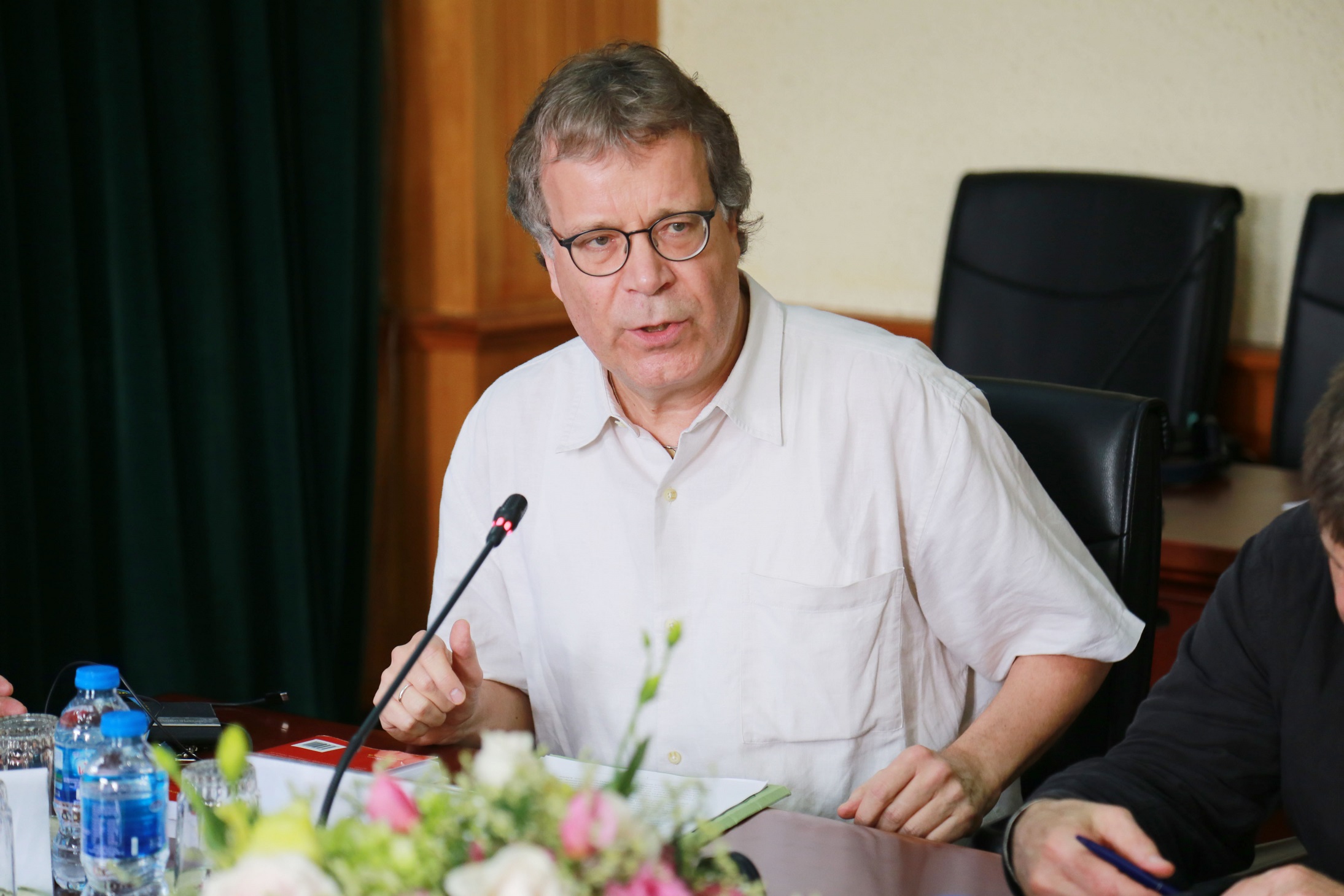
In German, the term "myth" is associated with several rather different ideas and meanings: on the one hand, we place it on a supernatural level, a level beyond everyday life; however, on the other hand, we also find this word in everyday language: "I think it's an anecdote," is a common phrase, at least in everyday German. Between these two extremes, there are many different gray areas in understanding this term.
In general, we understand myths as stories, or to use a new German term, as "narratives." In our book, we understand myths and narratives in our own unique way, and this understanding can be described by the following passage:
“This book deals with stories and their relationship to reality and how we perceive them. The term 'story' has a very broad meaning: from stories detached from real experience and leading us to a fantastical world of imagination, to stories closely related to and attempting to shape reality. These stories are often called narratives. They can be very different: long stories, sometimes structured like epics, will contrast with those encapsulated in an aphorism, or even a symbol.”
When we use the term 'narrative,' we are referring to stories that have the potential to create meaning and identity, both collectively and individually. They convey values, emotions, and promote citizen inclusion. They can contribute to weakening or dismantling authoritarian forms of rule, but conversely, they can also support and even strengthen the power of those regimes. They contain both truth and fiction, and may even be a blend of fact and fiction.
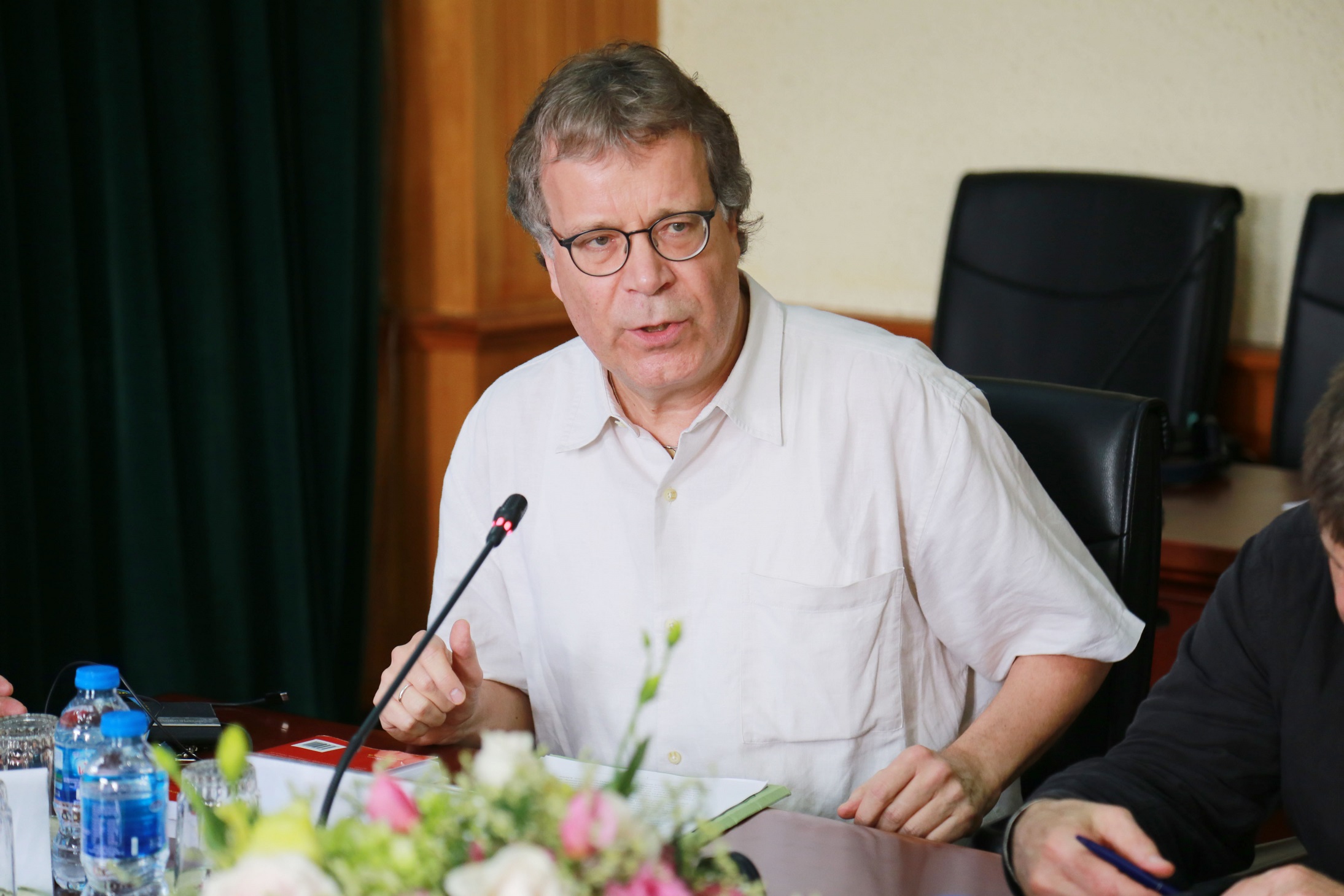
Dr. Jörg Wischermann
These narratives shape the image of a country, its society, economy, politics, and culture. They help create realities. People generally have enough understanding and ability to believe in the ability of narratives to depict reality.
Therefore, at least what we call reality is always shaped by narratives, and always contains narratives, while narratives always contain realities. Narratives and reality are interdependent, influence each other, are inseparable, and can be profoundly contradictory.
The above excerpt from the book clarifies that, in our understanding, myths are complex, even clearly contradictory. However, they are also fascinating because of these contradictions, as they can resolve oppositions and blend different meanings into a seemingly unified whole. Thus, myths dissolve seemingly mysterious elements and combine them into a solid narrative framework.
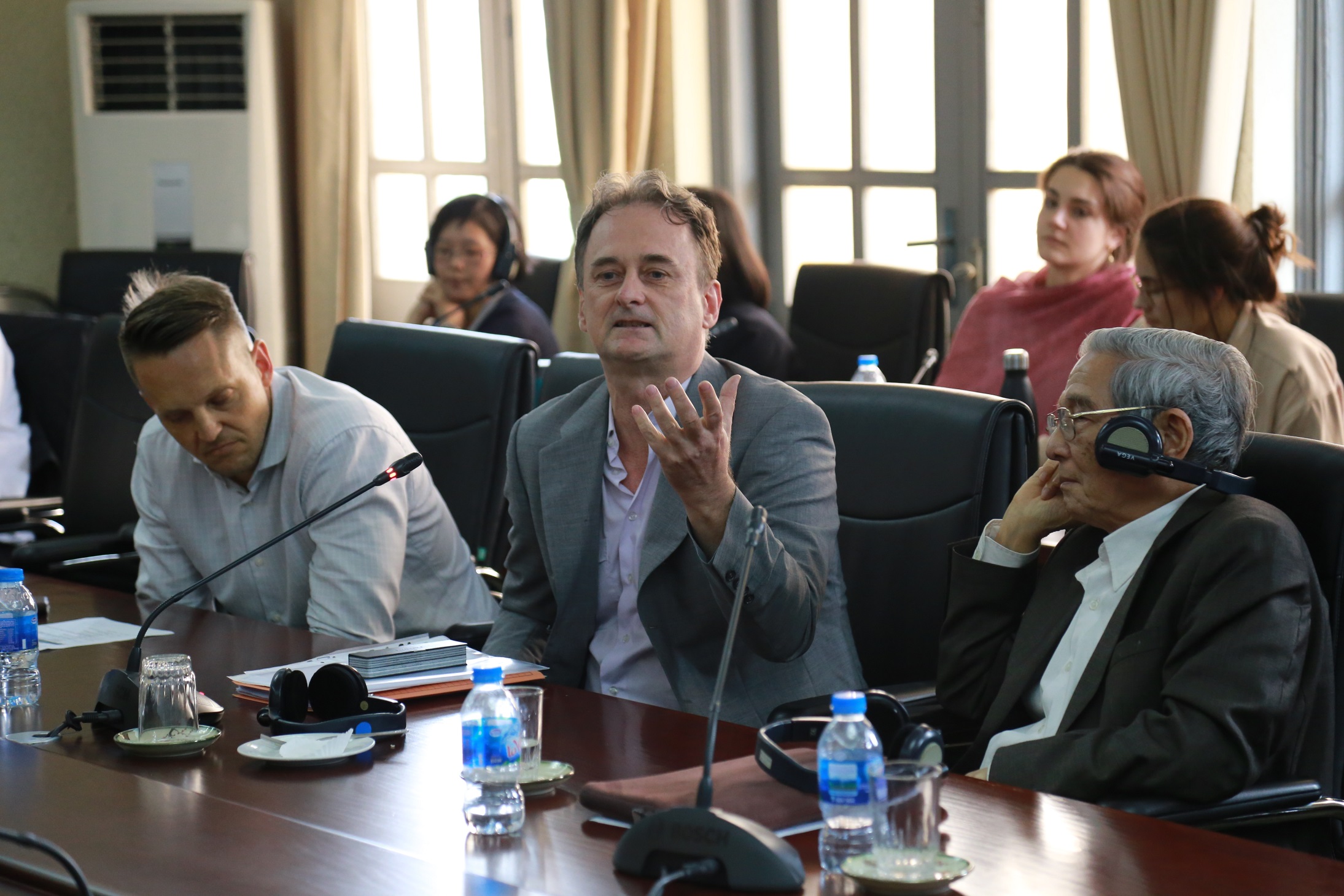
The book launch for "Vietnam: Myth and Reality," held at the University of Social Sciences and Humanities on March 21st, was attended by German and Vietnamese scientists.
Myths are inherently ambiguous, and because they serve multiple functions, we can describe them using the sociological term "polyvalent." This is especially true for "political myths." All the analyses of political myths we have seen in Vietnam, as well as those examined by many other authors, fit very well with the following definition by Claus Leggewie:
"Political myth is a narrative through which a shared identity is created, a 'sense of allegiance' is formed and implicitly accepted among different social strata and cultures within a group."
From a sociological perspective, myths create a collective consciousness and memory within large social groups, including nations, thereby fostering internal solidarity and historical continuity that transcends territorial and spatial boundaries.
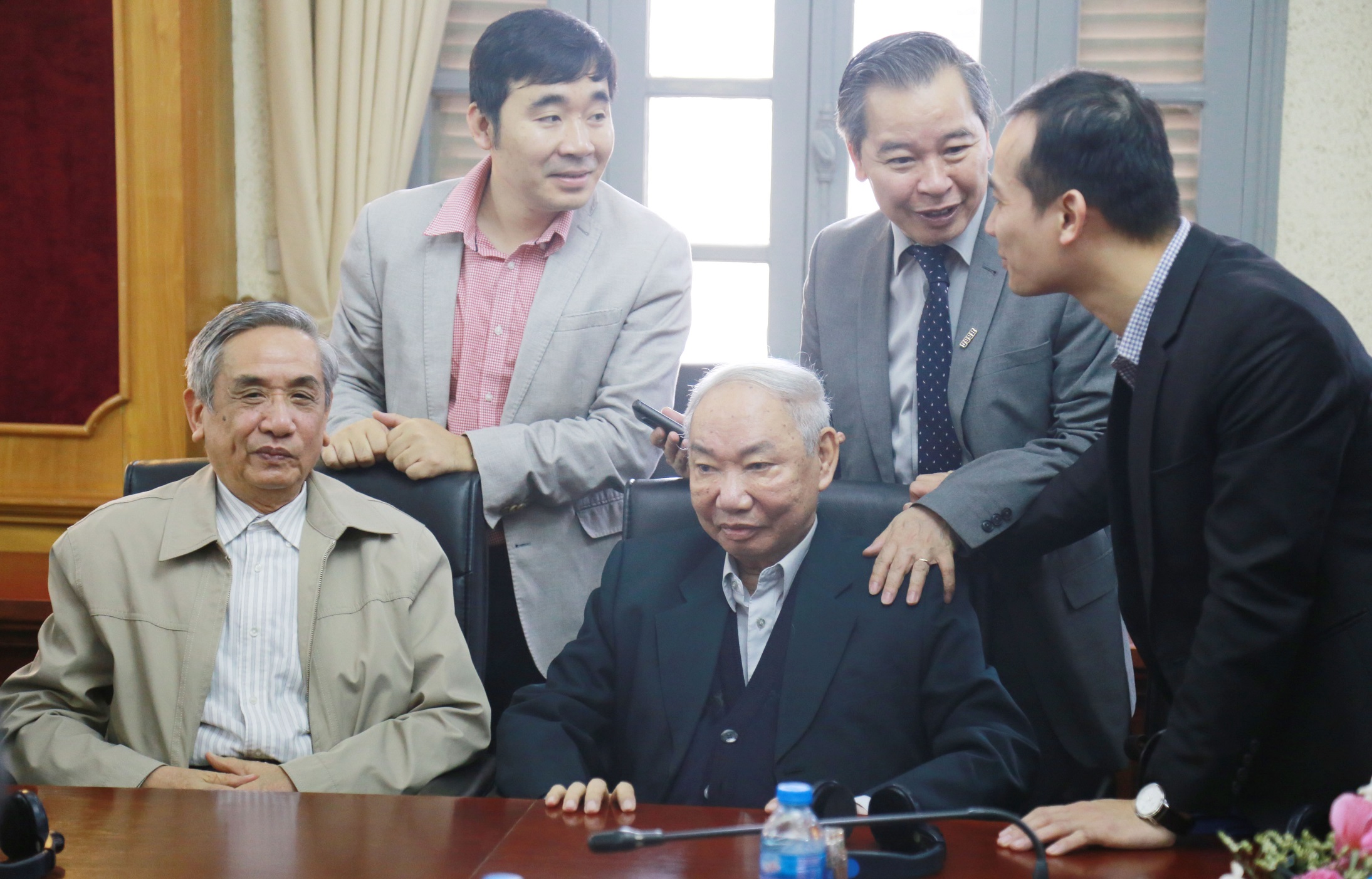
Professor Pham Quang Minh, the Rector, exchanges views with scientists at the book launch event.
Political myths are not geared towards thatcurrentlythatsoWithin a community, it therefore creates credibility and subsequently legitimacy. Political myths always contain elements of fiction and reality, history and predictions, past and present. Consequently, they are both true and false.”
Throughout the history of European knowledge, from Plato to the Enlightenment and the "Critical Theory" era of the 1930s, 1940s, and beyond, there has been immense interest in debunking and dismantling myths in order to uncover the truth and reality behind them.
In our book, we do not rely on such profound philosophical foundations. For, as Claus Leggewie puts it, we consider political myths to be both true and false, because we believe it would be counterproductive to separate processes that are inherently interdependent. We focus on thoroughly analyzing the content of important myths and examining their function. Therefore, we believe that all researchers need to address the following issues concerning political myths:
- What does the related mythology include, and what is its core content?
How did that legend come about?
- What is the contradiction between the verifiable data and the claims about that myth?
- How did that political myth contribute to consolidating and legitimizing the rule of the ruling class?
- Do myths have the ability to react against domination?
Why is that legend so fascinating?
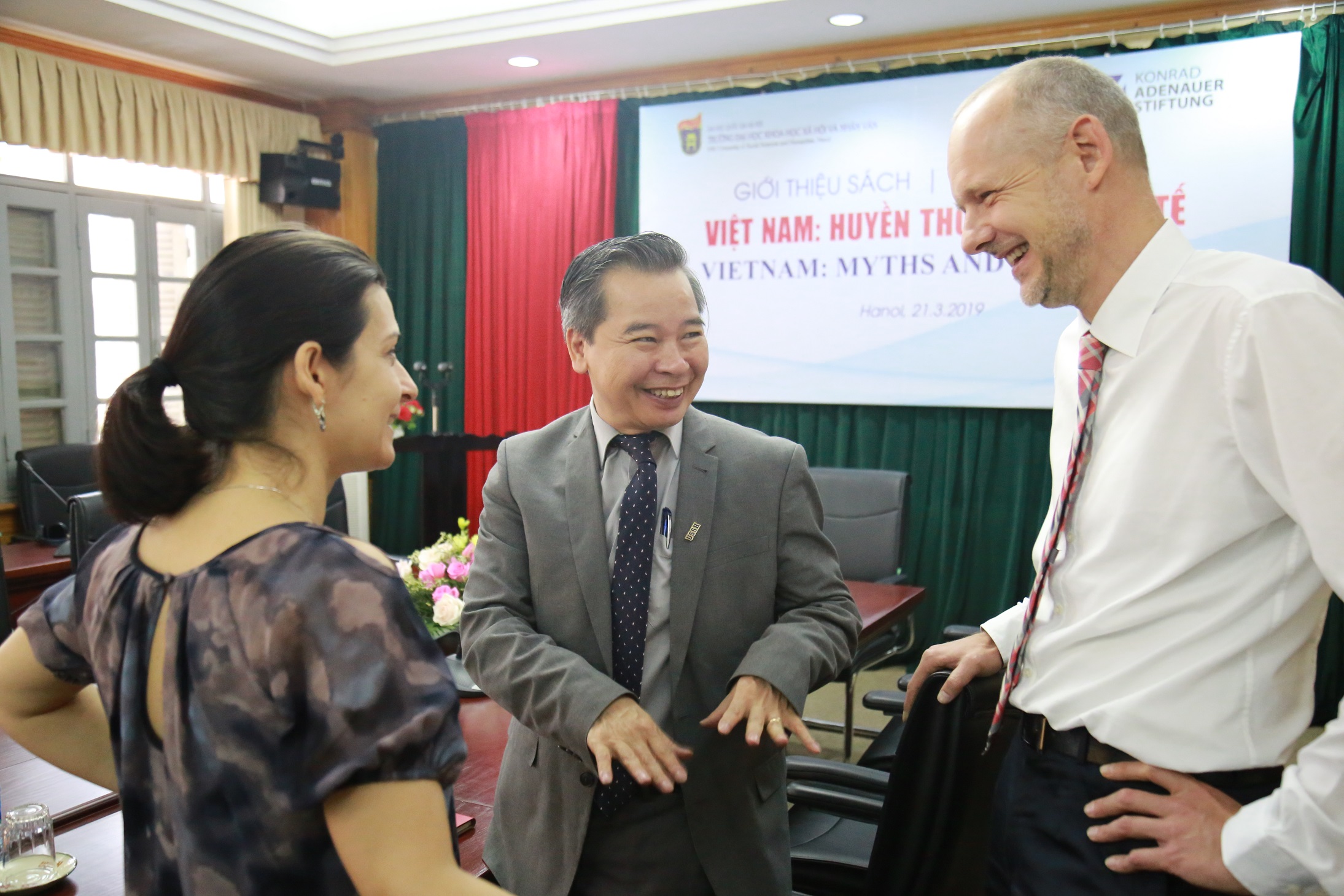
We examine such political myths in Vietnam, a country geographically distant from Germany, with a history and culture that share little resemblance to Germany and other European countries.
But despite those geographical and historical factors, relations between Vietnam and Germany have developed tremendously since the middle of the last century. Perhaps no country in Southeast Asia is as important to Germany as Vietnam. This led us to explore even the most extreme possibilities, to break down stereotypes, and thereby create a richer, yet more contradictory, image of "Vietnam and the Vietnamese people" than we did a few years ago, if not decades ago. Our collection will emphasize a more particular perspective.
However, this book only aims to build a new, or at least a different, perspective on Vietnam. Through analyzing the country's political myths in the fields of history, culture, politics, and economics, we want to reveal the nature and function of political myths in other countries, including Germany. This comparison between two seemingly very different worlds will help us analyze everything more clearly and incisively.
In the conclusion of the book, we attempt to draw some conclusions and point out corresponding issues in the German political and cultural environment.
In this context, we do not want to focus on points of overlap, but rather encourage the identification of similarities and differences, for example, when we compare the German "economic miracle" (1947/48) with the Vietnamese economic miracle after the "Doi Moi" reform policy was introduced (1986). Upon closer examination, both miracles share commonalities.
If we consider Adam Forde's analysis of the "Myth of the 1986 Party Congress" as the starting point for this collection; taking into account his argument about a form of "self-modernization" of the Vietnamese economy and society in the 1980s; and finally his conclusion that political strategies and measures had relatively little significance for the success of the "Vietnamese economic miracle" from the late 1980s and early 1990s, then it is clear that we need to immediately compare Vietnam's most recent economic miracle, which seems to have originated from and at the Sixth Congress of the Communist Party, with the myth of Germany's monetary reform of 1947-48 as the origin of the German economic miracle.
We agree with Forde that, to find the "causes" of the miraculous economic and social development in Germany and Vietnam, you don't just need to look at a few political events and measures like currency reform or a party congress. Instead, you must shift your focus to the economic and social structures and the interactions between various actors and within them, as the "causes" of the "miracle."
In this context, we wish to emphasize that in the Federal Republic of Germany, it seems that through the myth of monetary reform as the cause of the economic miracle, fundamental political, economic, and social changes are being prevented from impacting the existing economic and political order, as well as the old and new elites. The myth of monetary reform hinders the emergence of a fundamentally new, even socialist, order. For Vietnam, it can be said that the myth of the Sixth Party Congress helped consolidate the socialist republic and consequently the current political order. Furthermore, to some extent, the myth also helps economic and political managers maintain their positions.
In this book, we also explore a very popular political myth that was mentioned just last year, in the series of events commemorating the 50th anniversary of the 1968 "events." Here, I am referring to the myth of "solidarity with the Vietnamese" in Germany during the period 1965-1975. When analyzing this myth, I advise us not to view it, or internationalism at that time, as a "follow-the-revolutionary" solidarity, a voluntary and unanimous agreement between the strong and the weak.without any self-interest.
In my opinion, the students and those who honored Ho Chi Minh in the 60s and 70s, chanting his name and expressing solidarity with the "Vietnamese resistance," were all pursuing their own interests. Initially, internationalism and solidarity were primarily aimed at social change in Germany and were therefore merely derivative.
The view that Vietnamese solidarity was merely a derivative was also put forward by some former students who took to the streets in protest in the 1960s and 70s. In a dialogue between former German Parliamentary member representing the Green Party, Dietrich Wetzel, Daniel Cohn-Bendit (former French and German student leader, later a Green Party member of the European Parliament and currently an advisor to French President Macron) and Joschla Fischer (later a Green Party member, Minister of Environment of the state of Hesse and Federal Foreign Minister, later a visiting lecturer in the US), Dietrich Wetzel stated in 1979:
“Internationalism […] has a leading and therefore derivative function. If struggles are taking place in other countries, then empathizing with those struggles has a broader meaning for us. It means and implies that we are fighting against a state.”certain,At that time, the state that supported and opposed imperialism (the United States) was the Federal Republic of Germany; and at least for my generation, in that context, fascism played a very important role…
Joschka Fischer agrees:
“We chose myths based on our own needs, and constructed and framed them in our minds in the same way.” Internationalism, socialism, and the dream of another German republic, as Fischer put it, “are all ‘fantasies,’ into which we were ‘trapped.’” Clearly, it was a “sympathy with communism,” or rather: it was “sympathy […] with the succeeding struggle, and ultimately with the socialist state.”
More notably, the above also holds true for the solidarity within the "Vietnam International Solidarity Initiative" and its affiliated organizations, which later became extremely popular in West Germany in the 1970s and beyond (for example, the "Vietnam Action Association"). Here, the myth of the victorious struggle of the Vietnamese people and solidarity with them served the interests of political parties and ultimately the goal of reforming the Federal Republic of Germany, after North Vietnam, the German Democratic Republic, and the Soviet Union had done so. We dare not delve into the degree of paranoia of the above thinking, but only wish to use it to inspire social activities.
In any case, I would like to summarize the main point of my book as follows: Vietnam is a myth to the majority of people in the Federal Republic of Germany who championed the so-called "Solidarity with Vietnam" during the 1965-1975 period; and like any myth, it served many functions. Perhaps most importantly, it brought about fundamental political, economic, and cultural changes in our Federal Republic of Germany. This is not surprising, because such fundamental political, economic, and cultural changes are the very essence of social movements, and "Solidarity with Vietnam" was an essential part of the so-called Third World Movement in the Federal Republic of Germany.
Finally, I would like to ask whether the efforts to leverage the uniqueness of Vietnamese history and culture, and to assemble stories of the struggle against foreign invaders into a coherent Vietnamese national narrative, are not similar to Germany's more fragmented and less vigorous attempts to build and shape the core values of the "German Model Culture"?
We also know that such a perspective, transcending national borders, may be somewhat arbitrary and potentially contradictory. But that is precisely why we want this book to stimulate thought rather than simply repeating outdated truths in a new, old-fashioned way.
Author:Jörg Wischermann/Gerhard Will. Translated by Tran Minh.
Newer news
Older news